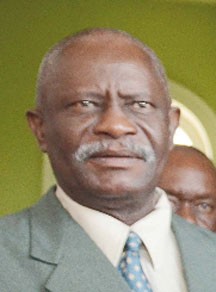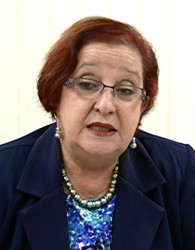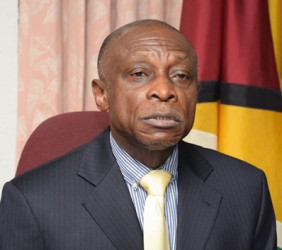Immigration authorities within the last year have denied entry to 186 CARICOM nationals because of “insufficient funds” and Minister of Citizenship, Winston Felix yesterday defended this stance saying that it is part of the efforts to prevent trafficking in persons.
“We are very concerned in some cases that we need to address this issue of trafficking in persons. For example women and young children arriving at your port and they have no support, they can’t show you evidence of how they will support themselves for a month…some of the persons were treated like that (deported) because we did not want to allow the development of any issue of trafficking in persons” he said during intensive questioning from members of the Parliamentary Sectoral Committee on Foreign Relations.

He along with the Minister of Foreign Affairs Carl Greenidge made presentations to the Committee on the mandates, roles and functions of their respective ministries with regard to the issuance of visas, work permits and citizenship. The presentations which were followed by a question and answer segment were made in the Parliament Chambers.
The information on the Caribbean nationals who were denied entry was contained in a written response which was submitted to the committee by Felix. That response was not shared with members of the media.
Chair of the Committee, PPP/C MP Gail Teixeira asked if there was a change in the immigration policy and how much money a person has to show before they are granted entry into Guyana.
“When we looked at what seems to be a rather large number of CARICOM nationals who got turned away or denied entrance then one wonders, because the freedom of movement of people makes it very clear on what grounds you can turn away people”, she said
Greenidge was the first to respond. He said that the authorities are bound by certain guidelines. “We do have certain guidelines which now follows from the CCJ (Caribbean Court of Justice) decision on the (Shanique) Myrie case”, he said adding that CARICOM member states are only now attempting in a phased manner to implement these.
“Some of those may not be fully in place in Guyana”, he said. He expressed the view that even when one accepts that there should be movement across the borders in keeping with the principles set out in the CARICOM Single Market it does not entitle Caribbean nationals to move wheresoever they wish whatever the circumstances. “They have to satisfy minimum requirements. He said Guyana does have an obligation as a member of the United Nations and under the Anti-Terrorism and the Anti-Money Laundering Acts.
Felix then said that the authorities are “rigid” in the enforcement of the immigration laws. He added that there may be situations that might set off a trigger in the mind of an immigration officer that “something is amiss”.

Noting that a review is presently being done, he said that an exercise was done last year to check on persons based on the address they gave for their stay. “Some of these addresses have no houses”, he said.
He stressed that foreigners are coming in and giving addresses that do not exist and that the Deputy Chief Immigration Officer Dale Alves was given the assignment to check on this.
“The immigration officers have to be very alert and careful when they are landing visitors to this country. We do not want to deny anybody the right to visit Guyana. We want to welcome everyone but there is some care which ought to be exercised. The immigration officers much be recognized as our door keepers”, he said.
Later in responding to follow-up questions from committee member, PPP/C MP Nigel Dharamlall, Felix questioned whether someone who arrived at the airport and indicated that he was staying at a resort for a month and only had US$200 in their possession should be allowed entry.
Grilled
“It is insufficient funds”, he said before being again grilled by Teixeira who clearly was not satisfied with the response. She asked the Minister how it is that an immigration officer would know how much the person has.

Felix in response said that this would be ascertained through questioning.
Teixeira then indicated that she has travelled through many Caribbean countries and had never been asked how much money she is traveling with.
“Maybe you don’t look like a Guyanese even though your passport might say so…or you might be an economic migrant”, he said to chuckles from other committee members.
She said that she knows there is a section of the immigration form which asks you to declare if you have over US$5000 in your possession. Felix said that in Barbados and Trinidad persons are profiled and making reference to the latter, he added that that country has been equally rigid on Guyanese as Barbados.
Greenidge added that they probably do not ask Teixeira how much money she travels with because she “does not fit the profile”.
Felix continued that the advance passenger list can be useful. “There have been some very glaring cases where even if you want to allow the person to enter you have to consider if you allow them when the money runs out what next”, he said.
He added that it is not the authorities’ desire to be turning away visitors but “again the gatekeepers must…respond to the situation as it occurs and make the right decision in the interest of the security of Guyana”.
Felix was continuously pressed on the criteria used to determine insufficient funds and the point was even made that person may use credit cards or get money through money transfer agent, Western Union. He however explained that the total circumstances have to be looked at to determine whether a person seeking entry into Guyana had enough funds to support his or her stay.
Meanwhile, documents presented to the committee showed that a total of 366 Guyanese have been deported from eight countries from January 1, 2015 to June 30 this year. The bulk was for overstaying followed by illegal entry.
According to the figures provided, 157 Guyanese were deported from Trinidad; 119 overstayed their time and 26 entered illegally. With regards to Suriname there were 134 deportees; 100 for illegal entry and 31 for overstaying their time.
Barbados had the next highest number of Guyanese deportees. Of the 60 persons 40 overstayed their time.




